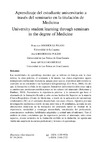Identificador persistente para citar o vincular este elemento:
https://accedacris.ulpgc.es/jspui/handle/10553/55647
| Campo DC | Valor | idioma |
|---|---|---|
| dc.contributor.author | Rodríguez Pulido, Francisco | en_US |
| dc.contributor.author | Rodríguez Pulido, Josefa | en_US |
| dc.contributor.author | Artiles Rodríguez, Josué | en_US |
| dc.date.accessioned | 2019-06-04T15:23:11Z | - |
| dc.date.available | 2019-06-04T15:23:11Z | - |
| dc.date.issued | 2018 | en_US |
| dc.identifier.issn | 1133-9926 | en_US |
| dc.identifier.other | Dialnet | |
| dc.identifier.uri | https://accedacris.ulpgc.es/handle/10553/55647 | - |
| dc.description.abstract | Las modalidades de aprendizaje docentes que se utilizan en Europa son: la clase teórica, la clase práctica, el seminario y la tutoría. Las clases magistrales siguen irrumpiendo con bastante frecuencia, aunque poco a poco, el profesor universitario se convierte en un orientador o un facilitador del aprendizaje (Del Pozo, 2008). De ahí que, la formación recibida en los espacios formativos universitarios debe estar sujeta a cambios que produzcan modificaciones en los saberes del alumnado (Bekerman y Dankner, 2010). Presentamos la experiencia práctica y la valoración que hace el alumnado de la formación llevada a cabo en una Institución Superior en la materia Clínica Psiquiátrica (Grado de Medicina), a través de la aplicación del aprendizaje colaborativo (AC) en el seminario desarrollado con casos clínicos. Optamos por una investigación cualitativa a través de una entrevista a 16 estudiantes, acotada en seis dimensiones didácticas de la formación del alumnado (nivel de bondad de la experiencia, modalidad y estrategia desarrollada, tutorización del profesorado, conocimientos recibidos, habilidades adquiridas y actitud ante el enfermo). Tras el análisis de éstas, concluimos que la experiencia permite al alumnado, entre otros aspectos, evocar recuerdos de la formación recibida en la titulación, les aporta una visión más amplia de la carrera profesional y favorece el aprendizaje. | en_US |
| dc.description.abstract | The teaching learning modalities used in Europe are: the theoretical class, the practical class, the seminar and the tutoring. Magisterial classes continue to break out quite frequently, although little by little, the university professor becomes a counselor, or a facilitator of learning (Del Pozo, 2008). Hence, the training received in the university training spaces must be subject to changes that produce modifications in the knowledge of alumando (Bekerman and Dankner, 2010). We present the practical experience and the assessment that the students make of the training carried out in a Higher Institution in the field of Psychiatric Clinic (Degree of Medicine), through the application of collaborative learning (AC) in the seminar developed with clinical cases . We opted for qualitative research through an interview with 16 students, bounded by six didactic dimensions of student training (level of kindness of the experience, modality and strategy developed, teacher tutoring, knowledge received, skills acquired and attitude towards the sick). After analyzing these, we conclude that the experience allows students, among other aspects, to evoke memories of the training received in the degree, gives them a broader view of the professional career and favors learning. | en_US |
| dc.language | spa | en_US |
| dc.relation.ispartof | Docencia e Investigación | en_US |
| dc.source | Docencia e Investigación [ISSN 1133-9926], v. 43 (29), p. 67-87 | en_US |
| dc.subject | 58 Pedagogía | en_US |
| dc.subject.other | Enseñanza Superior | en_US |
| dc.subject.other | Clínica Psiquiátrica | en_US |
| dc.subject.other | Metodología | en_US |
| dc.subject.other | Desarrollo Colaborativo | en_US |
| dc.subject.other | Seminarios | en_US |
| dc.subject.other | Higher Education | en_US |
| dc.title | Aprendizaje del estudiante universitario a través del seminario en la titulación de Medicina | en_US |
| dc.title.alternative | University student learning through seminars in the degree of Medicine | en_US |
| dc.type | info:eu-repo/semantics/article | en_US |
| dc.type | Article | en_US |
| dc.identifier.url | http://dialnet.unirioja.es/servlet/articulo?codigo=6745752 | - |
| dc.description.lastpage | 87 | - |
| dc.identifier.issue | 29 | - |
| dc.description.firstpage | 67 | - |
| dc.relation.volume | 43 | - |
| dc.investigacion | Ciencias Sociales y Jurídicas | en_US |
| dc.type2 | Artículo | en_US |
| dc.contributor.authordialnetid | No ID | - |
| dc.contributor.authordialnetid | 189517 | - |
| dc.contributor.authordialnetid | 3076340 | - |
| dc.identifier.dialnet | 6745752ARTREV | - |
| dc.identifier.ulpgc | Sí | es |
| dc.description.dialnetimpact | 0,0 | |
| dc.description.dialnetq | Q3 | |
| dc.description.dialnetd | D7 | |
| item.fulltext | Con texto completo | - |
| item.grantfulltext | open | - |
| crisitem.author.dept | GIR Organización, Procesos Educativos y Teoría de la Educación | - |
| crisitem.author.dept | Departamento de Educación | - |
| crisitem.author.dept | GIR Organización, Procesos Educativos y Teoría de la Educación | - |
| crisitem.author.dept | Departamento de Educación | - |
| crisitem.author.orcid | 0000-0003-0195-0801 | - |
| crisitem.author.orcid | 0000-0002-2492-2486 | - |
| crisitem.author.parentorg | Departamento de Educación | - |
| crisitem.author.parentorg | Departamento de Educación | - |
| crisitem.author.fullName | Rodríguez Pulido, Josefa | - |
| crisitem.author.fullName | Artiles Rodríguez, Josué | - |
| Colección: | Artículos | |
Los elementos en ULPGC accedaCRIS están protegidos por derechos de autor con todos los derechos reservados, a menos que se indique lo contrario.
